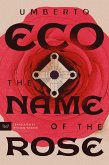In 1327, Franciscans in a wealthy Italian abbey are suspected of heresy, and Brother William of Bakersville arrives to investigate. His delicate mission is overshadowed by seven bizarre deaths that take place in the same number of days, and Brother William must turn detective to sort things out.
A spectacular best seller and now a classic, The Name of the Rose catapulted Umberto Eco, an Italian professor of semiotics turned novelist, to international prominence. An erudite murder mystery set in a fourteenth-century monastery, it is not only a gripping story but also a brilliant exploration of medieval philosophy, history, theology, and logic. In 1327, Brother William of Baskerville is sent to investigate a wealthy Italian abbey whose monks are suspected of heresy. When his mission is overshadowed by seven bizarre deaths patterned on the book of Revelation, Brother William turns detective, following the trail of a conspiracy that brings him face-to-face with the abbey's labyrinthine secrets, the subversive effects of laughter, and the medieval Inquisition. Caught in a power struggle between the emperor he serves and the pope who rules the Church, Brother William comes to see that what is at stake is larger than any mere political dispute-that his investigation is being blocked by those who fear imagination, curiosity, and the power of ideas. The Name of the Rose offers the reader not only an ingeniously constructed mystery-complete with secret symbols and coded manuscripts-but also an unparalleled portrait of the medieval world on the brink of profound transformation.
Hinweis: Dieser Artikel kann nur an eine deutsche Lieferadresse ausgeliefert werden.
A spectacular best seller and now a classic, The Name of the Rose catapulted Umberto Eco, an Italian professor of semiotics turned novelist, to international prominence. An erudite murder mystery set in a fourteenth-century monastery, it is not only a gripping story but also a brilliant exploration of medieval philosophy, history, theology, and logic. In 1327, Brother William of Baskerville is sent to investigate a wealthy Italian abbey whose monks are suspected of heresy. When his mission is overshadowed by seven bizarre deaths patterned on the book of Revelation, Brother William turns detective, following the trail of a conspiracy that brings him face-to-face with the abbey's labyrinthine secrets, the subversive effects of laughter, and the medieval Inquisition. Caught in a power struggle between the emperor he serves and the pope who rules the Church, Brother William comes to see that what is at stake is larger than any mere political dispute-that his investigation is being blocked by those who fear imagination, curiosity, and the power of ideas. The Name of the Rose offers the reader not only an ingeniously constructed mystery-complete with secret symbols and coded manuscripts-but also an unparalleled portrait of the medieval world on the brink of profound transformation.
Hinweis: Dieser Artikel kann nur an eine deutsche Lieferadresse ausgeliefert werden.
"Explodes with pyrotechnic inventions, literally as well as figuratively. Hold on till the end." - New York Times
"Like the labyrinthine library at its heart, this brilliant novel has many cunning passages and secret chambers . . . Fascinating . . . ingenious . . . dazzling." - Newsweek
"The Name of the Rose succeeds at being amusing and ambitious at the same time. It can be regarded as a philosophical novel masked as a detective story, or a detective story masked as a historical novel, or even better as a blend of all three. The venture sounds improbable, but Eco carries it out." - New York Review of Books
"A brilliantly conceived adventure into another time, an intelligent and complex novel, a lively and well-plotted mystery." - San Francisco Chronicle
"Whether you're into Sherlock Holmes, Montaillou, Borges, the nouvelle critique, the Rule of St. Benedict, metaphysics, library design, or The Thing from the Crypt, you'll love it. Who can that miss out?" - Sunday Times (London)
"Unfolds in an atmosphere thick with hostility and intrigue . . . Although The Name of the Rose is not a story of semiotics, Eco the novelist shares with Eco the semiotician a feeling for the world as a place rich with possible meanings." - Christian Science Monitor
"Like the labyrinthine library at its heart, this brilliant novel has many cunning passages and secret chambers . . . Fascinating . . . ingenious . . . dazzling." - Newsweek
"The Name of the Rose succeeds at being amusing and ambitious at the same time. It can be regarded as a philosophical novel masked as a detective story, or a detective story masked as a historical novel, or even better as a blend of all three. The venture sounds improbable, but Eco carries it out." - New York Review of Books
"A brilliantly conceived adventure into another time, an intelligent and complex novel, a lively and well-plotted mystery." - San Francisco Chronicle
"Whether you're into Sherlock Holmes, Montaillou, Borges, the nouvelle critique, the Rule of St. Benedict, metaphysics, library design, or The Thing from the Crypt, you'll love it. Who can that miss out?" - Sunday Times (London)
"Unfolds in an atmosphere thick with hostility and intrigue . . . Although The Name of the Rose is not a story of semiotics, Eco the novelist shares with Eco the semiotician a feeling for the world as a place rich with possible meanings." - Christian Science Monitor








